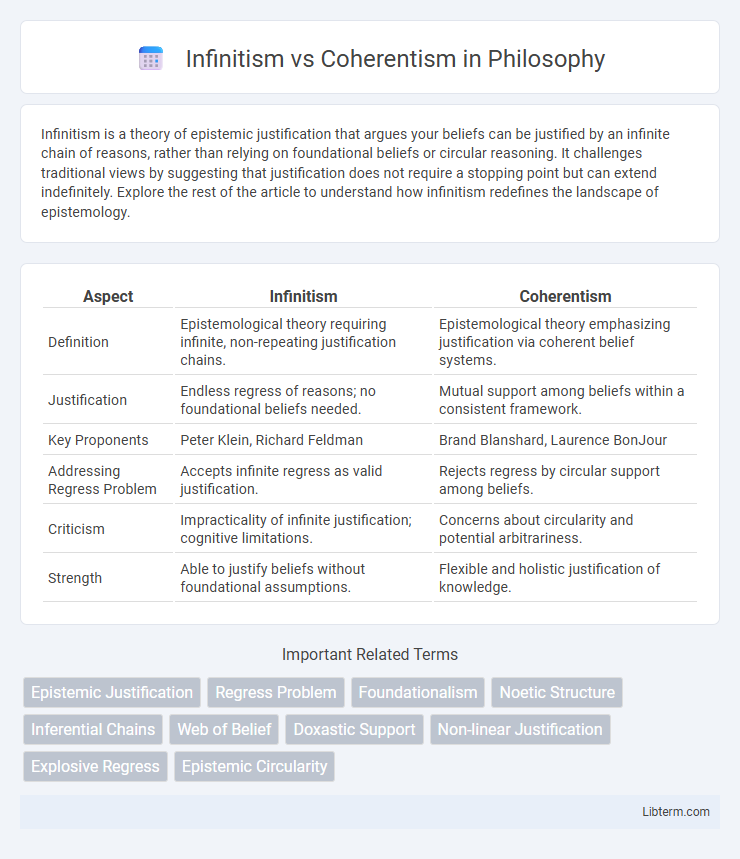Infinitism is a theory of epistemic justification that argues your beliefs can be justified by an infinite chain of reasons, rather than relying on foundational beliefs or circular reasoning. It challenges traditional views by suggesting that justification does not require a stopping point but can extend indefinitely. Explore the rest of the article to understand how infinitism redefines the landscape of epistemology.
Table of Comparison
| Aspect | Infinitism | Coherentism |
|---|---|---|
| Definition | Epistemological theory requiring infinite, non-repeating justification chains. | Epistemological theory emphasizing justification via coherent belief systems. |
| Justification | Endless regress of reasons; no foundational beliefs needed. | Mutual support among beliefs within a consistent framework. |
| Key Proponents | Peter Klein, Richard Feldman | Brand Blanshard, Laurence BonJour |
| Addressing Regress Problem | Accepts infinite regress as valid justification. | Rejects regress by circular support among beliefs. |
| Criticism | Impracticality of infinite justification; cognitive limitations. | Concerns about circularity and potential arbitrariness. |
| Strength | Able to justify beliefs without foundational assumptions. | Flexible and holistic justification of knowledge. |
Introduction to Epistemological Theories
Infinitism and Coherentism represent distinct epistemological theories addressing the justification of beliefs. Infinitism posits that justification requires an infinite, non-repeating chain of reasons, avoiding foundational premises, whereas Coherentism argues that beliefs are justified through their coherence within an interconnected system without relying on foundational beliefs. These contrasting approaches highlight fundamental differences in how knowledge and justification are conceptualized within epistemology.
Defining Infinitism in Epistemology
Infinitism in epistemology asserts that justification for any belief requires an infinite, non-repeating chain of reasons, rejecting the need for foundational beliefs. Unlike coherentism, which emphasizes mutual support among beliefs within a system, infinitism demands an endless, progressive structure of evidence to avoid circularity or arbitrary stops. This view challenges traditional models by proposing that epistemic justification is a potentially infinite, rationally accessible process.
Key Principles of Coherentism
Coherentism holds that beliefs are justified if they cohere with a consistent and comprehensive system of interconnected beliefs, emphasizing mutual support among propositions rather than foundational premises. This epistemic theory rejects the need for indubitable basic beliefs, instead relying on the overall coherence, including logical consistency, explanatory power, and integration within the belief network. Key principles include holistic justification, where the credibility of each belief depends on its relations to others, and the avoidance of epistemic regress by circular support within the belief system.
Historical Context of Infinitism and Coherentism
Infinitism and Coherentism emerged as influential epistemological theories during the 20th century, engaging with the problem of epistemic justification. Infinitism traces its roots to early modern philosophy, notably drawing on thinkers like Peter Klein who revived interest in infinite chains of reasons as a response to foundationalism and skepticism. Coherentism, influenced by rationalist traditions and philosophers such as Brand Blanshard and Laurence BonJour, developed as an alternative emphasizing the mutual support of beliefs within a holistic system rather than linear justificatory chains.
Major Proponents and Philosophical Developments
Infinitism, championed by philosophers like Peter Klein and Matthias Steup, asserts that justification for beliefs requires an infinite chain of reasons, rejecting foundational beliefs. Coherentism, advanced by theorists such as Laurence BonJour and Keith Lehrer, argues that beliefs are justified by their coherence within a mutually supportive web of propositions, rather than by linear chains. Major philosophical developments include Klein's formal defenses of infinitism that address the regress problem and BonJour's elaboration of coherentist epistemology emphasizing systemic unity and mutual support among beliefs.
Infinitism: Infinite Justification Chains
Infinitism in epistemology asserts that knowledge is justified through an infinite chain of reasons, where each belief is supported by another, extending indefinitely without circularity or foundational stopping points. This contrasts with coherentism, which holds that beliefs are justified by their coherence within a mutually supportive system of propositions. The infinite regress in infinitism challenges traditional foundationalism by rejecting basic beliefs and demands an unending justificatory process to avoid epistemic arbitrariness.
Coherentism: Network Models of Justification
Coherentism, as a network model of justification, asserts that beliefs are justified by their mutual support within an interconnected system, rather than relying on foundational axioms. This epistemic framework emphasizes the coherence of the entire belief set, where justification emerges from the logical consistency, explanatory power, and integration of individual beliefs. Prominent philosophers like Keith Lehrer and Laurence BonJour have expanded on coherentist theories, highlighting the dynamic harmony and mutual reinforcement essential for a justified belief system.
Criticisms of Infinitism
Infinitism faces criticism for its reliance on an infinite regress of justification, which many argue is impractical and cognitively unfeasible for human beings. Critics also highlight that infinitism struggles to provide a satisfactory stopping point in the chain of reasons, undermining its applicability as a reliable epistemic framework. Moreover, opponents claim that infinitism fails to address the problem of epistemic grounding, unlike coherentism which seeks coherence within a closed system of beliefs.
Challenges Facing Coherentism
Coherentism faces challenges such as the problem of circularity, where beliefs justify each other without foundational grounding, leading to potential epistemic regress issues. Critics argue that coherent systems can be internally consistent yet disconnected from reality, making them susceptible to false but coherent belief sets. The difficulty in establishing an objective measure of coherence further complicates the justification process in coherentist epistemology.
Infinitism vs Coherentism: Comparative Analysis
Infinitism posits an infinite, non-repeating chain of justification for beliefs, contrasting with Coherentism's reliance on a network of mutually supporting beliefs that form a coherent system. While Infinitism emphasizes endless regression to avoid foundational assumptions, Coherentism prioritizes the internal consistency and holistic fit of beliefs within the entire belief system. This fundamental difference highlights Infinitism's appeal in addressing skepticism through infinite justification, whereas Coherentism counters skepticism via systemic harmony and mutual support among beliefs.
Infinitism Infographic

 libterm.com
libterm.com